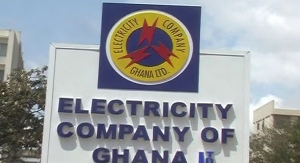Akosombo (E/R), Feb. 25 GNA- The Minister for Works and Housing, Alhaji Mustapha Ali Idris, has urged management and staff of the Community Water and Sanitation Agency (CWSA) to ensure that all guinea worm endemic communities are provided with potable water this year. He said the government has released a total of 40.8 billion cedis from the HIPC fund for the guinea worm eradication, sanitation and hygiene.
Alhaji Ali Idris who was addressing this year's Annual Review Conference of CWSA at Akosombo on Tuesday, asked the Agency to take measures that would help arrest the problem of guinea worm in the country since the government had demonstrated its commitment towards the programme.
The four-day conference under the theme "Effective utilization of the decentralized structures for accelerated safe drinking water and improved sanitation" is being attended by Regional Directors of the Agency and all key stakeholders in the water and sanitation sub-sector. It aims at reviewing achievements and shortcomings of the past, identifying problems militating against targets set for the previous years and set new targets for the current year.
Alhaji Idris regretted that Ghana should be the second most endemic guinea worm endemic country in the world and directed the Agency to ensure that contractors and consultants who are selected for various projects executed their work to the highest acceptable standards in their areas of operations.
"Your technical expertise must be brought to bear on your operation and the quality of works carried out under your supervision", he stressed.
The Minister asked the Agency to seriously consider all the factors that were militating against the progress of implementation of the various projects, adding that every effort should be made to remove all bottlenecks so that delivery of physical facilities would be accelerated.
He asked the Agency to ensure that the expected roles of the decentralized structures are not just performed but enhanced to enable the accelerated coverage to be achieved, saying "it would not be acceptable for any one, particularly from CWSA, to say that the district assemblies are not playing their roles.
The Chief Executive of the CWSA, Mr. Kofi Asamoah, who gave an overview of its performance for last year, said in the collaborating partners it targeted 1,600 new boreholes and 220 new hand-dug wells for rural communities, in addition to the rehabilitation of 100 boreholes to provide water to some 595,000 people.
At the end of the year, however, he said 1,260 boreholes were drilled, 214 hand-dug wells sunk and 115 boreholes were rehabilitated to serve 536,250 people.
Mr. Asamoah said during the period under review, the CWSA delivered water facilities to 1.273 million people out of 1.208 million people targeted.
In the sanitation sub-sector, he said 10,659 households and 567 institutional latrines were provided out of the targeted 10,000 households and 350 institutions.
Mr. Asamoah appealed to the government to release the Agency's budgeted operational expenditure of 10.2 billion cedis otherwise its activities for the year would be seriously affected.
He said the Agency had extended its spare parts distribution channels to all regional centres in the country to ensure potable water for the communities, while CWSA has also launched a hand washing with soap campaign project with mothers and children as the targets.
Mrs. Cecilia Amoah, Chairperson of the Board called on the staff to team up and work hard to ensure that the Agency achieves high standard performance and its set targets,
She assured them that the board would work hard to ensure improved conditions of service but said this would depend on the availability of resources.
The Eastern Regional Minister, Dr Francis Osafo-Mensah, said the government's strategy is to give priority to the provision of potable water and good sanitation as a means to improve health conditions in the rural and sub-urban communities.
He noted that since there had been a significant increase in budgetary support to the rural water and sanitation sub- sector, there was the need for those in charge of the implementation of the programme to perform their duties efficiently.
He said the various structures at all levels must therefore be effectively utilized for accelerated provision of safe drinking water and improved sanitation delivery.
Dr Osafo-Mensah, the Eastern Regional Minister asked all stakeholders in the water sector to work towards improving the national potable water coverage of the rural communities from the current 41.2 per cent to 85 percent by the year 2015 as envisaged by government.
Regional News of Wednesday, 25 February 2004
Source: GNA
















